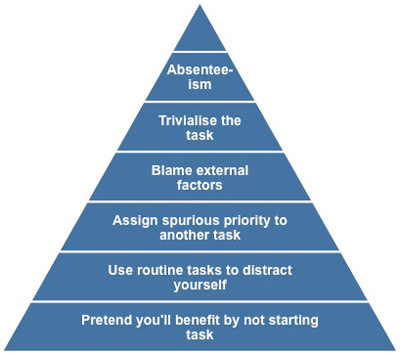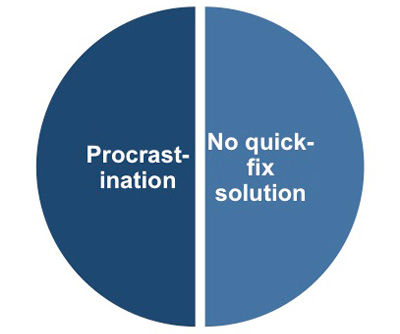Stop Procrastinating - Symptoms of Procrastination
Overcoming procrastination is extraordinarily difficult and involves first coming to terms with and recognizing the fact that this is the way you behave and that it is causing you problems with your productivity. Then you need to re-educate your own thinking and attitude towards these tasks.
Generally speaking, procrastination is something that will have been part of an individual's make-up for a large part of their life and may date back to their school days. For this reason, they will usually have developed coping responses to it.
The strategies and tactics that are most frequently used are designed to reduce the feelings of guilt and stress associated with putting off important personal goals. Our Overcoming Procrastination eBook is designed to help you understand the problem better and learn some successful ways of dealing with it.
 |
You should ask yourself if you have ever used any of the following to justify your own behavior:
Absenteeism: you avoid going to the location where the task takes place, or meeting with the required person or persons needed to perform the task. This is usually achieved by taking sick days or vacation time. You can also avoid visiting the location or not calling the required person.
Trivializing the task: you make the task appear less important in some way. For example,
'They've managed without it up to now, how important can it be?'
Blaming external factors: you use the rationalization that you are unable to start on the task due to an issue or information required from an external force, which is beyond your control. For example,
'I need finance to send me those figures before I can even make a start.'
Assigning spurious priority to another task: pretending to yourself that the task you are working on is in fact more important than the task you are putting off. You can also persuade yourself that a task others keep distracting you with is more urgent than the one you are procrastinating over.
Distracting yourself with routine or inconsequential work: your attention is diverted from the outstanding task by immersion in other work. Your reasoning is that you'll 'just finish these things off' or 'I'll just tidy these things up first' and then you'll give your attention to that task. For example,
Responding to routine emails or chatting to other team members etc.
Pretending that you will benefit from not starting: convincing yourself that you will perform the task better if you leave it until the last minute. For example
'I always do this sort of thing better when I'm under stress.'
Remember, procrastination is usually a behavior that has developed over a long period of time.
As such, you will find it hard to resist adopting quick-fix solutions, justifying to yourself that when this situation arises again you'll adopt the right approach and not put off this task. It is not just a matter of simply trying to apply more and more willpower to overcome procrastination - that seldom works?
 |
You have to re-learn how to prioritize your work and make yourself look at the 'whole' picture not just your role's perspective. This readjustment is often a steep learning curve if you have just recently been promoted to a managerial position.
If you find yourself behaving in any of the ways just mentioned the best method to incorporate into your work practices is to identify and analyze the environmental and mental barriers that are preventing you from starting the task at hand.
You may also be interested in:
Stop Procrastinating | Why People Procrastinate | Dealing with Boring or Pointless Tasks | Dealing With Tasks Involving Confrontation | Tasks You Resent Being Given | Tasks That Appear Overwhelming | Tasks You Don't Know How to Begin | Tasks You Are Afraid of Completing | Lack of Motivation.



